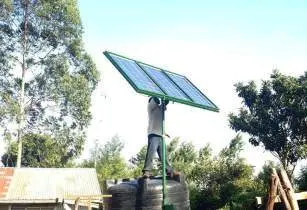Thirteen ventures, including the ones in Africa, are the recipients of around US$13mn in funding from the Powering Agriculture: An Energy Grand Challenge for Development (PAEGC) programme
The 13 projects come from nine countries, and seven are Africa-focused. The funding was divided among them, with Kenya’s SunCulture receiving the largest grant of US$2mn.
Each venture facilitates the use of renewable energy in agriculture, enabling communities in the developing world to more easily achieve food security and economic stability.
FuturePump (Kenya) is a growing startup that is in the process of bringing its Sunflower solar irrigation pump – an easy-to-maintain piston pump that will be offered with financing options to reduce the upfront barriers for farmers – to market.
SunCulture (Kenya) will sell AgroSolar Irrigation Kits (ASIK), solar-powered irrigation systems in Kenya, Tanzania, Uganda, and Zambia. The kit combines solar water pumping technology with high-efficiency drip irrigation and includes everything a farmer needs to grow more while spending less.
iDE Bangladesh (United States) will pilot a renewable energy micro-grid in Bangladesh to power fish hatchery water-pumping activities and households which currently rely extensively on diesel and kerosene.
The Institute for University Cooperation (ICU) (Italy) will install solar energy-powered drip irrigation systems at pilot farms in Jordan and Lebanon, where water is scarce. The systems support fertilizer distribution as well, and will be offered with training and support in accessing financing.
Universidad del Valle de Guatemala (Guatemala) develops low-cost community utility companies in off-grid villages through localised photovoltaic (PV) micro-grids operated by local for-profit service providers. This ‘utility in a box’ approach can attract private sector financing, reducing the need for further donor funding.
Ariya Capital Group Limited (Kenya) is a fund manager that develops, structures, invests, and manages clean energy and infrastructure projects throughout sub-Saharan Africa. The funding will go towards clean energy projects for locally-owned flower and horticulture farms in Kenya, Uganda, and Tanzania at a low upfront cost to farmers, using technology suitable for each user.
Claro Energy (India) will offer a pay-per-use irrigation service in India using portable solar pumps. Farmers will call a toll-free call line to order the service and pre-pay, allowing them to irrigate their farmland without upfront capital investment in equipment.
Horn of Africa Regional Environment Center and Network — Addis Ababa University (Ethiopia) is developing a solution that uses infrared technology to reduce coffee pulp drying time from several days to hours, minimising post-harvest loss. The technology will be powered by biogas generated from coffee pulp and coffee husks. Coffee accounts for 60 per cent of Ethiopia’s export earnings.
University of Toronto (Canada) is conducting research focused on a new, inexpensive, low-maintenance aquaculture aeration technology that does not require electricity. In partnership with Curiositate and local organization BRAC Enterprises, the university will conduct field trails in Bangladesh.
Husk Power Systems (India) will install hybrid solutions that combine biomass gasification and solar PV systems in Ghana and Nigeria, in partnership with local organisations. The micro-grids will produce energy for agriculture and residential needs, using local agricultural waste and sunlight to offer affordable energy.
SimGas Tanzania, Ltd. (Tanzania) is developing the first off-grid, biogas-powered milk chiller at farm level to help small dairy farmers reduce milk losses and meet quality standards required to access the formal sector. The biogas will be produced using cow manure in on-farm digesters.
KickStart International (Kenya) is designing and piloting easy-to-install, flat pack solar irrigation pumps. The organization has partnered with Encap Technologies, which manufactures low-cost, highly efficient pumps that only require small solar panels, to keep the systems affordable.
Village Infrastructure Angels (VIA) (UK) plans to install solar mills in villages in Indonesia, Papua New Guinea, the Philippines, and Vanuatu. The mills will allow rural villagers to process crops such as rice, corn, and cassava through a microfinancing programme.
The PAEGC programme will invest a total of US$$47.1mn over the seven years it is scheduled to run (2012-2019), funded by The United States Agency for International Development (USAID), the Government of Sweden (SIDA), the Government of Germany (BMZ), Duke Energy Corporation, and the United States Overseas Private Investment Corporation (OPIC).
871 teams from startups and universities submitted ideas, which ranged from microgrid technologies to irrigation and cold storage solutions. The winners were announced at the 2015 Powering Agriculture Innovator Showcase on 20 November 2015.





